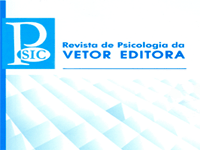
ISSN 1676-7314 printed version
ISSN 2175-3512 online version
INSTRUCTIONS TO AUTHORS
• Publication norms
• Editorial norms
• Articles types
• Article submission
• Form of presentation
|
|
• Publication norms |
| The Revista Psic offers a space to the ideas and information changes, concerning to distinct psychological knowledge areas. Original collaborations will be accepted by professionals belonging or not to an university. |
| 1. Selective process. Manuscripts conforming to categories 1 - 8 above will be evaluated on the basis of thematic relevance and the methodological quality. A Manuscript will be accepted for analysis with the assumption that (a) all authors are in agreement with the submission of the manuscript for publication in the Revista Psic, and (b) any person cited as the source of personal communication agrees with that citation. The authors must send its papers to the journal's Editorial Board: Rua Cubatão, 48. |
Manuscripts related to Psychology, in the following categories 1. Research report: Investigation based on empirical data, using a scientific method. Limited to 20-25 pages, including figures, tables and references. 2. Theoretical study: Analysis of theoretical constructs leading to the questioning of existing themes and the elaboration of hypothesis for future research. Limited to 15-20 pages. 3. Report of professional experience: Case study, with analysis of conceptual implications, or description of procedures or strategies of intervention, with methodologically appropriated evidence of the efficacy, of interest for practicing psychologists in various areas. Limited to 10 pages. 4. Critical review of literature: Analysis of extensive body of investigation related to a subject of interest for the development of psychology, in which an evaluation is done considering its more and less important issues and the area requirements. Limited to 15-20 pages. 5. Research Note: Report of limited research supplementing a specific investigation. Limited to 15 pages. 6. Letter to the Editor: Critical evaluation of an article published in Psic, or the response of an author to such criticism. Limited to 5 pages. 7. Review: Critical review of a recently-published book, informing readers of its contents and potential audience. Limited to 5 pages. 8. Debate: Register of the opinion of the individuals involved in polemic issues, either directly or indirectly. Limited to 5 pages. |
Manuscripts should be sent to the editors of Psic including: (1) a letter asking for its publication in the Revista Psic, (2) three hard copies of the manuscript (fax not accepted), (3) a digital copy in an authorized format on a floppy disk labeled with the name of the file containing the article. |
Manuscripts in Portuguese, Spanish and English are accepted. Notes for publication: The journal Psic adopts the style sheet of the APA (4th Edition, 2001). REFERENCES 1. Common references Citation of Citation Para Sbardelini (1996 apud Santos , 2000) or Para Sbardelini (1996) apud Santos (2000). Citation in press (Sampaio, in press) or Sampaio (in press). Books Baptista, M.N. & Assumpção Jr., F.B. (1999). Depressão na adolescência: Uma visão multifatorial. São Paulo : EPU. Corporate authorship American Psychological Association. (1994). Publication manual of the American Psychological Association (4th ed). Washington: Author. Book Chapter Martinelli, S.C. (2001). Os aspectos afetivos das dificuldades de aprendizagem. Em F.F. Sisto, E. Boruchovitch, L.D.T. Fini, R.P. Brenelli & S.C. Martinelli (Orgs.). Dificuldades de aprendizagem no contexto psicopedagógico (pp. 99-121). Petrópolis: Vozes. Article from a Scientifical Journal Sisto, F. F. (2000). Relationships of the Piagetian cognitive development to human figure drawing. Child Study Journal, 30(4), 225-232. Article accepted to publication or in press Noronha, A.P.P. (in press). Problemas graves e freqüentes no uso dos testes psicológicos. Psicologia Reflexão e Crítica. Paper presented in a congress, with the abstracts or summary published in the Annals Santos, A.A.A. (2000). Remediação e prevenção: experiência em uma universidade. Anais do V Congresso de Psicologia Escolar e Educacional, Itajaí, 37. Paper presented in a congress, but not published Santarem, E.M.M. (1998). Efeito da fluoxetina sobre a polidipsia induzida por esquema enquanto possível modelo animal de comportamento compulsivo e sobre a resposta operante de pressionar a barra. Trabalho apresentado no I Congresso de Pesquisa e Extensão e IV Encontro de Iniciação Científica, Bragança Paulista. Unpublished Dissertation and Thesis Rueda, F.J.M. (2005). DFH-Escala Sisto e Matrizes Progressivas Coloridas de Raven: estudos de validade. Dissertação de Mestrado. Universidade São Francisco, Itatiba. Güntert, A.E.V.A. (1996). Crianças com nódulo vocal: estudo da personalidade por meio da prova de Rorschach. Tese de Doutorado. Universidade Federal de São Paulo - Escola Paulista de Medicina, São Paulo. Documents from eletronical sources Journal articles Bueno, J.M.H., Oliveira, S.M.S.S. & Oliveira, J.C.S. (2001). Um estudo correlacional entre habilidades sociais e traços de personalidade. PsicoUSF, 6(1) 31-38. Acessado em 15/06/2005, PePSIC (Periódicos Eletrônicos em Psicologia): http://www.bvs-psi.org.br/ Text Linacre, J.M. (1996). Structure in Rasch residuals: Why principal components analysis? Rasch Measurement Transactions, 10(3). Disponível em http//www.rasch.org/rmt/rmt122m.htm. Access 01/12/2003. |
[Home] [About this journal] [Editorial board] [Subscription]
© 2006 Revista Psic
Rua Cubatão, 48
CEP: 04013-000 Paraíso - São Paulo - SP
Tel.: +55 11 3146-0333